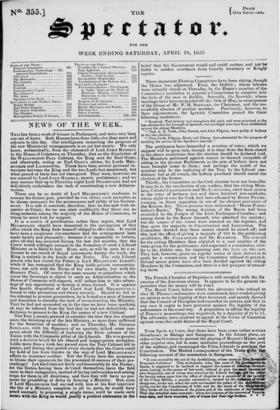NEWS OF THE WEEK.
'Tuts has been a week of leisure in Parliament, and not a very busy one out of doors. Both Houses have done little else than meet and adjourn to this day. Our intelligence respecting the progress of
the new Ministerial arrangements is as yet but scanty. We only know, authentically, from the statement of Lord Joust RUSSELL
in the House of Commons on Thursday, that on the dissolution of
the WELLINGTON-PEEL Cabinet, the King sent for Earl GREY, and afterwards, acting on Earl GREY'S advice, for Lords MEL- BOURNE and LANSDOWNE. There have been several personal in-
terviews between the King and the two Lords last mentioned, but what passed at them has not transpired. They were, however, we
are assured by Lord JOHN RUSSELL, merely preliminary ; and we may assume that up to Thursday night Lord MELBOURNE had not definitively undertaken the task of constructing a new Adminis- tration.
There can be no doubt of Lord MELBOURNE'S readiness to resume his former post, provided he can obtain sueh securities as
he deems necessary for the permanence and utility of his Govern- roent. It is safe to conclude, therefore, that he has met with ob- stacles at Court; for we can state confidently that there are no disagreements among the majority of the House of Commons, to whom he must look for support.
It is a source of gratification rather than regret, that Lord MELBOURNE should have demurred to the assumption of that office which the King finds himself obliged to offer him. It would have been a suspicious circumstance had the arrangement been made hastily and pleasantly ; because it is impossible to believe, after all that has occurred during the last five months, that the Court would willingly consent to the formation of such a Liberal Ministry as is likely to last. Even now, as will be seen by a re- ference to our record of Royal movements during the week, the King is entirely in the hands of the Tories. The only Liberal person who has visited the Palace is Lord MELBOURNE himself; while it has transpired that the King holds private communica- tions, not only with the Tories of his own family, but with Sir ROBERT PEEL. Of course the same reasons or prejudices which cause the Sovereign to object to such an Administration as the House of Commons will support, will induce him to take advan- tage of any opportunity to destroy it when formed. It is against this hostile disposition of the Court that. Lord MELBOURNE is bound to take precaution and obtain security. Should he fail in the attempt to procure guarantees, he is bound as a man of honour and discretion to abandon the task of reconstructing the Ministry. That he had not succeeded up to the time we have been•speaking of, may be inferred from the fact that he had not definitively un- dertaken to present to the King the names of a new Cabinet. The Tory journals pretend to consider the time that has elapsed since the breaking up of the late Ministry, as more than sufficient for the formation of another; and on Thursday, Mr. GEORGE SINCLAIR, with the flippancy of an apostate, talked some non- sense about the difficulty of replacing the Doric column of the Tories with the Composite pillar of the Liberals. He was greeted with a derisive laugh for his absurd and inappropriate metaphor. Little more than a week has passed since the Tory Cabinet fell to pieces, and during that period every obstacle that the Court could lay hold of has been thrown in the way of Lord MELBOURNE'S efforts to construct another. Yet the Tories have the assurance to blame their opponents for the presumed ill-success of their pro- ceedings! Let the Court act fairly and honourably by the Nation ; let the Tories, having been defeated themselves, leave the field open to their antagonists, instead of laying ambuscades and setting traps for them in all directions, and then they will have no pre- ?nee for grumbling at delay in forming a Ministry. But, even if Lord MELBOURNE had carried with him at his first interview the list of a Ministry complete in all its parts, he would have acted unwisely in proposing a single name, until he made such terms with the King as would justify a prudent statesman in the belief that his Government would and could endure, and not by liable to sudden overthrow from Courtly treachery or Kingly caprice.


























